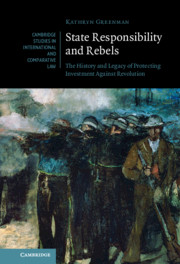Book contents
- State Responsibility and Rebels
- Cambridge Studies in International and Comparative Law
- State Responsibility and Rebels
- Copyright page
- Contents
- Acknowledgements
- Table of Cases
- 1 The Past and Present of State Responsibility for Rebels
- 2 The System: Mixed Claims Commissions in the Shadow of Empire
- 3 The Cases: Autonomy, Ambiguity and Doctrine in the Work of the Commissions
- 4 The Scholarship: Resistance and Development
- 5 The Codification Projects: Stalemate
- 6 The Legacy: Protecting Investment against Revolution in the Decolonised World
- Bibliography
- Index
- Cambridge Studies in International and Comparative Law
2 - The System: Mixed Claims Commissions in the Shadow of Empire
Published online by Cambridge University Press: 13 August 2021
- State Responsibility and Rebels
- Cambridge Studies in International and Comparative Law
- State Responsibility and Rebels
- Copyright page
- Contents
- Acknowledgements
- Table of Cases
- 1 The Past and Present of State Responsibility for Rebels
- 2 The System: Mixed Claims Commissions in the Shadow of Empire
- 3 The Cases: Autonomy, Ambiguity and Doctrine in the Work of the Commissions
- 4 The Scholarship: Resistance and Development
- 5 The Codification Projects: Stalemate
- 6 The Legacy: Protecting Investment against Revolution in the Decolonised World
- Bibliography
- Index
- Cambridge Studies in International and Comparative Law
Summary
In the nineteenth- and early-twentieth centuries, mixed claims commissions were established as a way of resolving claims for injuries caused to foreign nationals by rebels when political instability, especially in the form of revolution and civil war, threatened foreign imperial and commercial ambitions and interrupted periods of capitalist expansion in decolonised Mexico and Venezuela. Enforcing state responsibility for such claims was often the justification for intervention in Latin America during the late nineteenth- and early twentieth-centuries. While not all of the mixed claims commissions were imposed by the threat or use of force, invasion, occupation and bombardment existed alongside arbitration as part of a spectrum of more or less coercive measures to protect foreign commerce and capital during this time. The system of mixed claims commissions – as a political intervention in decolonised Latin America – served to insulate global economic liberalisation against revolution and civil war in the decolonised world, by taking the question of who assumed the risk of harm by rebels out of the scope of national authority.
Keywords
- Type
- Chapter
- Information
- State Responsibility and RebelsThe History and Legacy of Protecting Investment Against Revolution, pp. 36 - 68Publisher: Cambridge University PressPrint publication year: 2021

